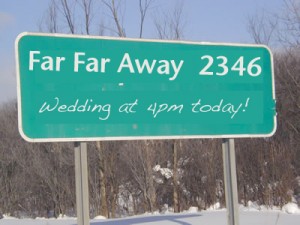 So you are planning to get married far from home. Not just your home, everyone-you-know’s home. You have folks flying in from all over the world and you want everyone to be comfortable. Do you know all of your options? What are you considering? This is the first installment of a series about destination wedding logistics and ideas. Let’s start with lodging and meals.
So you are planning to get married far from home. Not just your home, everyone-you-know’s home. You have folks flying in from all over the world and you want everyone to be comfortable. Do you know all of your options? What are you considering? This is the first installment of a series about destination wedding logistics and ideas. Let’s start with lodging and meals.
The conventional wisdom on destination wedding etiquette is varied. Some say that it is the responsibility of the attendants to pay for their own travel expenses and accommodations. Other advice columns suggest that the couple pay guests’ expenses, including: flights, transportation expenses, lodging, and celebratory events. Please carefully consider the type of expenses you are willing and able to cover. Balance your happiness with thoughtfulness towards guests.
Perhaps getting married far away is a strategy. Often when couples feel pressured to invite many people they opt for a far away place to exchange their vows. A destination wedding can be a way to insure your wedding is a manageable size. Be sure that this is the best option.
If a destination wedding is your dream wedding know that you can keep costs under control and still create a memorable and special experience for your family and guests. Here are a few options for creating a special experience:
Lodging. Hotels and motels can be an easy option for guests and wedding planners. Rooms can be reserved in advance at a discounted rate. Attendants need only to call ahead and show up. This is a great option. Another fantastic option is home rental. Renting a loft, townhouse, bungalow, or apartment will suit some destination weddings better than others. In NYC and Hawaii it served our families very well. If you are marrying in a city, reserve hotel rooms for guests that are not comfortable navigating urban landscapes or public transportation. For other guests include sites like Air BnB, VRBO, timeandplace.com, and vacationrentals.com in your invites or on your website. These services offer outstanding deals around the globe. This can be very economical in a city and often will feel more like home than a hotel.
Meals. Meals are an area overlooked by many. If you are in a remote destination, meals may be limited to what is immediately available. Hotels often house cafés and restaurants. If some opt for apartment rental they may also opt to cook for themselves. I once attended a welcome dinner that consisted of pizza, salad, beer, wine, and trivia. It was an excellent introduction to family and friends of the couple. Beach picnics including local fruits and cuisine can be a welcomed exposure to local custom. If someone in the family decides to rent a house or apartment hosting “family style dinners” is a nice way to socialize. Also, creating a list for guests with options (low, med, high recommendations) is another way to help them navigate your location. Walking tours with small samples is a super way to feed people and get them talking. Offering a cooking class or wine/cheese pairing can be excellent too. Just let your choices reflect your style, budget, and guests.
These are some ideas to help guide you in your planning. Check out the options for yourself. See what suits the people you are inviting. Be conscience of physical limitations or other factors unique to your guests. But also remember that people will be happy to accommodate your wishes. Next time, the will be on the entrée de jour will consist of transportation options and communications.




No Comments